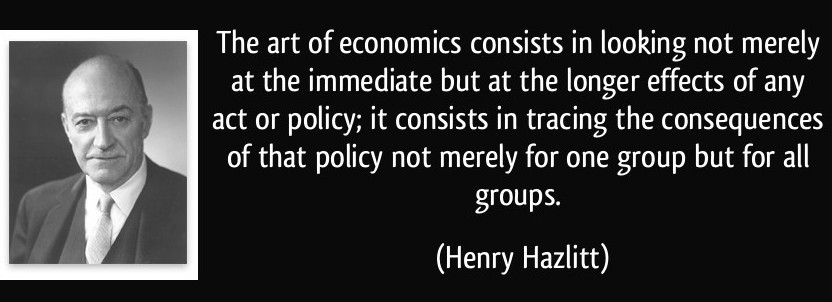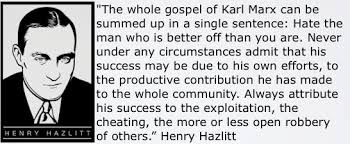|
home | what's new | other sites | contact | about |
||
|
Word Gems exploring self-realization, sacred personhood, and full humanity
Henry Hazlitt Economics In One Lesson The Blessings Of Destruction
"It is solemnly reaffirmed everyday by captains of industry ... labor union leaders ... editorial writers ... professors of economics in our best universities...
"They see 'miracles of production' which it requires a war to achieve. And they see a world made prosperous by an enormous 'accumulated' or 'backed-up' demand. "In Europe they joyously counted the houses, the whole cities that 'had to be replaced.' In America they counted the houses that could not be built during the war, the nylon stockings that could not be supplied, the worn-out automobile tires, the obsolescent radios and refrigerators...
"It was merely our old friend, the broken-window fallacy, in new clothing, and grown fat beyond recognition. This time it was supported by a whole bundle of related fallacies.
"The more war destroys, the more it impoverishes, the greater is the post-war need... But need is not demand. Effective economic demand requires not merely need but corresponding purchasing power. The needs of India today are incomparably greater than the needs of America. But its purchasing power, and therefore the 'new business' it can stimulate, are incomparably smaller. "But if we get past this point, there is a chance for another fallacy, and the broken-windowites usually grab it. They think of 'purchasing power' merely in terms of money. Now money can be run off by the printing press...
"But as most people are so firmly in the habit of thinking of their wealth and income in terms of money, they consider themselves better off as these monetary totals rise, in spite of the fact that in terms of things they may have less and buy less.
"They could be produced just as well by an equivalent peacetime inflation. We shall come back to this money illusion later. "Now there is a half-truth in the 'backed-up' demand fallacy, just as there is in the broken-window fallacy. The broken window did make more business for the glazier... The destruction of houses and cities did make more business for the construction and building industries ... automobiles, radios ... for those particular products. "To most people this seemed like an increase in total demand, as it partly was in terms of dollars of lower purchasing power. "But what mainly took place was a diversion of demand to these particular products from others... "The war, in short, changed the post-war direction of effort ... the structure of industry... "Some of the countries in which there was greatest destruction, such as Germany, have advanced more rapidly than others...
"What is harmful ... to an individual must be equally harmful ... to the collection of individuals that make up a nation...
"It should be obvious that real buying power is wiped out to the same extent as productive power is wiped out...
"The simple truth is that there is an optimum rate of replacement, a best time for replacement... "Plants and equipment cannot be replaced ... unless [one] can acquire the savings, the capital ... to make the replacement. But war destroys accumulated capital. "There may be, it is true, offsetting factors. Technological discoveries and advances during a war may ... increase individual and national productivity...
|
||
|
|

